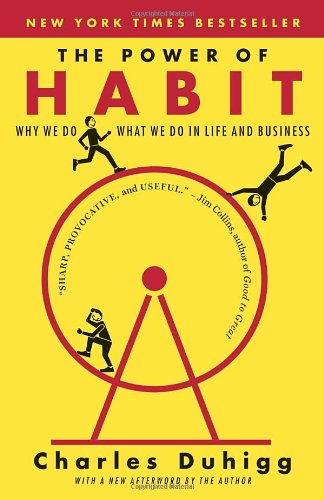 Habits are simple, but not so simple.
Habits are simple, but not so simple.
According to Charles Duhigg, habits are a) powerful forces in our lives (for good or not good) and b) changeable.
Habits have three parts:
- A cue (like the thought I have when I’m driving somewhere that frozen yogurt might be just the thing right now)
- A routine (stopping for frozen yogurt)
- The reward (yum)
As humans, we have cravings. For example:
- Distraction (not always so good)
- A sense of accomplishment (for example, a sense of pride when stepping on the scale and seeing the weight go down)
- Endorphins (for example, from exercise—or chocolate)
- Salt, sugar, fat
- The tingling sensation of toothpaste (which has nothing to do with healthier teeth, but still, we like the feeling, therefore, we brush)
Habits = Cue ➤ Routine ➤ Reward (Repeat)
Keystone Habits
Much of what we do each day is governed by habits. And some are “keystone habits,” which “spill over” to other areas of our lives. For example:
- Exercise. When people develop an exercise habit, they also eat and sleep better. They feel less stress. Productivity increases. Plus, they spend their money more wisely.
- Make Your Bed. Want to spend 3 minutes for a better day? This habit is correlated with “better productivity, a greater sense of well-being, and stronger skills at sticking with a budget” p. 109.
- Eat Dinner Together. Want your children to do well in school, feel better emotionally, and have more confidence? Make family meals a habit.
Apparently, keystone habits cause chain reactions, where one good habit triggers another.
Changing a Habit
So, what if you have a habit that’s not really your friend? In the case of the frozen yogurt habit that I confessed earlier, I was able to let it go by identifying the cue and the craving, thinking about the reward, and planning to do something else. Like this:
- Identify the Cue. I’m running an errand. Here’s what happens: I start thinking about having a yummy treat at a nearby frozen yogurt shop.
- Identify the Craving. Is it hunger? Not really. Social? No. Instead, it’s the taste. I think/remember that it feels good to eat frozen yogurt.
- Plan Ahead. Next time I’m tempted to eat frozen yogurt, I’m going to remember the sugar mood swing that happens afterward. That feels bad. I’m also going to remember how much I like to hit my calorie targets for the day. That feels good. Instead of stopping to get frozen yogurt, I’m going to go about my errands and end up feeling better for two good reasons.
- “Saying No” in the Moment. I’m driving. Yes, I think. Frozen yogurt sounds great, but remember that sugar rush afterward? Really, it doesn’t feel good. Plus, I don’t have room for the calories, and I will feel great about making my calorie goal. So, today I’m not stopping.
It’s Up to Us
Much of who we are is made up of habits: mood, productivity, tidiness, sociability.
Can we change these habits? Yes. There’s a great story in the book about William James. During a low point in his life, he decided this:
I will assume for the present—until next year—that [my ability to change] is no illusion. My first act of free will shall be to believe in free will.~William James, p. 272
After making this decision and following his own advice, William James turned his life around.
Organizations have habits, too, and they can be positive, healthy, and productive—or not. With the right process, organizations can change their habits (although this is not easy).
Noticing that we have (or wish to have) a particular habit, and believing that we can make changes in our lives (barring conditions beyond our control), gives each of us more autonomy.
We do not have to be slaves to our habits.
We can even make a habit of changing our habits for the better.
Resources
Book | The Power of Habit
Book Review | Changing for Good: A Revolutionary Six-Stage Program for Overcoming Bad Habits and Moving Your Life Positively Forward
Post | 4 Ways Sugar Could Be Harming Your Mental Health
Audio | Performance Improvement Book Club Discussion on The Power of Habit
Duhigg Interview & Transcript | The Power to Trade Naughty Habits for Nice Ones
Book Review | Making Habits, Breaking Habits: Why We Do Things, Why We Don’t, and How to Make Any Change Stick
